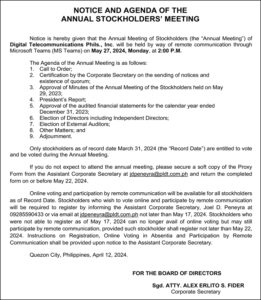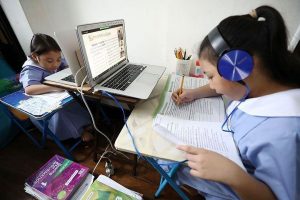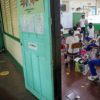RECORD HEAT in the Philippines this month has forced schools to send children home for online classes, reviving memories of COVID lockdowns and raising fears that more extreme weather in the years to come could deepen educational inequalities.
Pupils at 7,000 public schools in the Southeast Asian country were sent home last week due to unusually hot weather in many areas that forecasters have linked to the effects of the El Niño weather phenomenon.
Teacher Erlinda Alfonso, who works at a public elementary school in Quezon City near the capital, said she did not know what was worse for her pupils — sweltering in an overcrowded classroom or trying to study at home.
“Some students told me they prefer going to school because the heat is worse at home,” she said, adding that many of her students live in nearby shantytowns and have no internet connection to take part in online classes.
While teachers are providing offline assignments to students without internet access, Ms. Alfonso said the arrangement left children with no one to raise questions with.
“If there’s something they could not understand, their parents or siblings are often not at home because they need to earn a living,” said the 47-year-old, who also heads the city’s association of public school teachers.
The Philippines had one of the world’s longest school shutdowns during the COVID-19 pandemic, which highlighted the education gap faced by children from low-income families without computers or sufficient internet access.
But with most public schools in the country of 115 million people poorly equipped to deal with soaring temperatures and other extreme weather, online classes have become the safest option during the heatwaves, teachers and unions say.
The Health department on Wednesday said it had recorded 34 cases of heat-related illness, including six deaths, from Jan. 1 to Apr. 18.
These were from central Visayas, the Ilocos region in the country’s north and the Soccsksargen region in the southern Philippines.
The state weather bureau expected 30 areas in the country to experience scorching temperatures of up to 46C on Wednesday.
‘UNBEARABLE’
In public schools in Metro Manila, the capital region, a survey of more than 8,000 teachers last month showed 87% of students had suffered from heat-related conditions.
More than three-quarters of teachers described the heat as “unbearable” in the survey conducted by the Alliance of Concerned Teachers of the Philippines — National Capital Region (ACT-NCR), a teaching association.
Nearly half or 46% of teachers said classrooms have only one or two electric fans, highlighting inadequate ventilation measures to deal with rising temperatures. “The heat had tremendous impact on children. Some students even col-lapsed inside classrooms. Teachers suffered from the heat, too, but often they would prioritize their students’ health inside classrooms,” Ruby Bernardo, spokesperson of ACT-NCR, told the Thomson Reuters Foundation.
As climate change fuels the frequency and severity of heatwaves, the problems faced by teachers and students in the Philippines look set to play out elsewhere.
About 243 million children in Asia and the Pacific are expected to be exposed to hotter and longer heatwaves over the coming months, the United Nations children’s agency, UNICEF, said last week.
Children are particularly susceptible to heat stroke, and UNICEF said prolonged exposure to intense heat also affects their ability to concentrate and learn.
Since the start of El Niño, “danger category” temperatures as high as 44C have been predicted by the country’s weather agency.
Filipino teachers say more measures are needed to deal with extreme heat in schools — from tackling shortages of classrooms and teachers, which lead to overcrowding, to providing free drinking water and having a school nurse or doctor on site.
The Alliance of Concerned Teachers has called on the Department of Education (DepEd) to address such issues.
It has also proposed the immediate reversion to the pre-pandemic school calendar, when the hot months of April and May fell during the long school break.
Asked to comment, a DepEd spokesperson said its policy of letting head teachers decide when to switch to online or offline home classes “provides a more immediate and effective response to heat conditions rather than knee-jerk changes that would further compromise learning recovery.”
Some teachers say the situation also underlines the need for more education about climate change.
“Climate change has not been comprehensively taught in our classrooms. But it’s a pressing issue linked to all the other challenges our education system is facing now,” Ms. Bernardo said.
For many low-paid public sector teachers, working in packed schools with nonexistent or inadequate cooling has been the last straw.
“The heat makes me want to resign or retire early,” Ms. Alfonso said. — Thomson Reuters Foundation with Kyle Aristophere T. Atienza




















